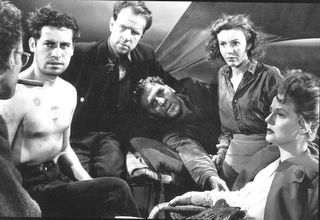Lifeboat
I don't know about you, but I sometimes become engrossed in old movies. To the point where I can forget that they are old, and almost expect them to conform to modern standards of decency and taste. It's one of the reasons that examples of racism is so galling in films of the 30's and 40's. Obviously, blatant racism is always upsetting to see in a film, but in a movie that feels otherwise sophisticated and contemporary, an offensive stereotype robs the film of its sense of timelessness, making it dated and old-fashioned.
Fortunately, though it features an African-American main character, Alfred Hitchcock's Lifeboat doesn't succumb to racist stereotypes. The 1944 film is, however, unabashedly jingoistic and xenophobic. If the film has any theme at all, it's this: "Never Turn Your Back on a Kraut!"
While understandable, this kind of abrupt nationalism and even fear-mongering is jarring to a modern sensibility. Even war movies today make an effort to view individuals as individuals, separate from the militaries to which they may or may not belong. Indeed, the alienation of the soldier from the army he serves is a major theme of contemporary cinema. This is not the case in Lifeboat, a tense and brilliantly executed thriller that calls for constant vigilance against the Fascist threat.
Very few filmmakers could have made a successful film out of John Steinbeck's premise for Lifeboat. A Merchant Marine supply ship is torpedoed and sunk by a U-boat in the mid-Atlantic. 8 survivors - including an injured seaman (William Bendix), a fast-talking war correspondant (the excellently-named Tallulah Bankhead), a nurse (Mary Anderson) and a scrappy British navigator (Hume Cronyn) - band together on a lifeboat to wait for rescue. They are soon joined by the commander of the German U-Boat (Walter Slezak), whose vessel has also just been sank.
What to do with their enemy captive? The castaways are split on how to deal with him. Some want to use his considerable seafaring abilities and knowledge of the local waters to their benefit, and then turn him in to the proper military authorities upon their return to civilization. The others want to, well, deal out their own justice.
Hitchcock, interestingly, tips his hand right away. The Nazi officer, who goes by Willy, hides his compass from his shipmates, and sets them on an improper course right from the start. He wants to go to a nearby German supply ship rather than make for the Bahamas, as the other castaways intend. Why let us know so early that the Nazi is planning subterfuge? It seems easier to create suspense later if we in the audience don't know Willy's intentions.
I can see a few possible reasons for Hitchcock to provide this information up front. Perhaps, in 1944, the British director was afraid to make a German character appear sympathetic, even for a few scenes. Even if he revealed in the end that Willy was a cruel manipulator who wanted nothing more than to send his new "friends" to the concentration camps, that's about 75 minutes of movie where a British and American audience would have to, essentially, root for a Nazi.
But it's also possible that Hitch saw the dramatic possibility inherent in the other survivor's reactions to Willy. We know he's up to no good, and the more that the weak-minded shipmates (like Bankhead's ego-maniacal and myopic reporter) fall for his schemes, the more it ratches up the suspense. Will the Americans discover the truth before it's too late? Will the one clear-headed survivor, engine room mechanic John Kovac (John Hodiak), convince his compatriots of Willy's malfeasance?
Hitchcock expertly weaves this material into the framework of a classic adventure story. There are storms, shortages of food and water, and a remarkable sequence in which Bendix's gangrenous leg must be amputated, without anaesthesia, by Willy, amidst rough seas, with what looks like a pocket knife. Ouch. (The operation is of course performed off-screen, but in a classic Hitchcock touch, we know it's over when an empty boot is cavalierly tossed on to the ship's deck).
If Lifeboat's only intention were to entertain, it would be a wholly successful endeavor. As it is, it's something of a historical curiosity, a lively adventure film with an odd WWII tilt. I can't say I wholly agree with its overriding message - that the enemy must be dealt with harshly and without mercy at all times, and that treachery is intrinsic to the German character - but, you know, those were different times, and it is what it is. German films of the time weren't exactly kind to my people, you know?

No comments:
Post a Comment